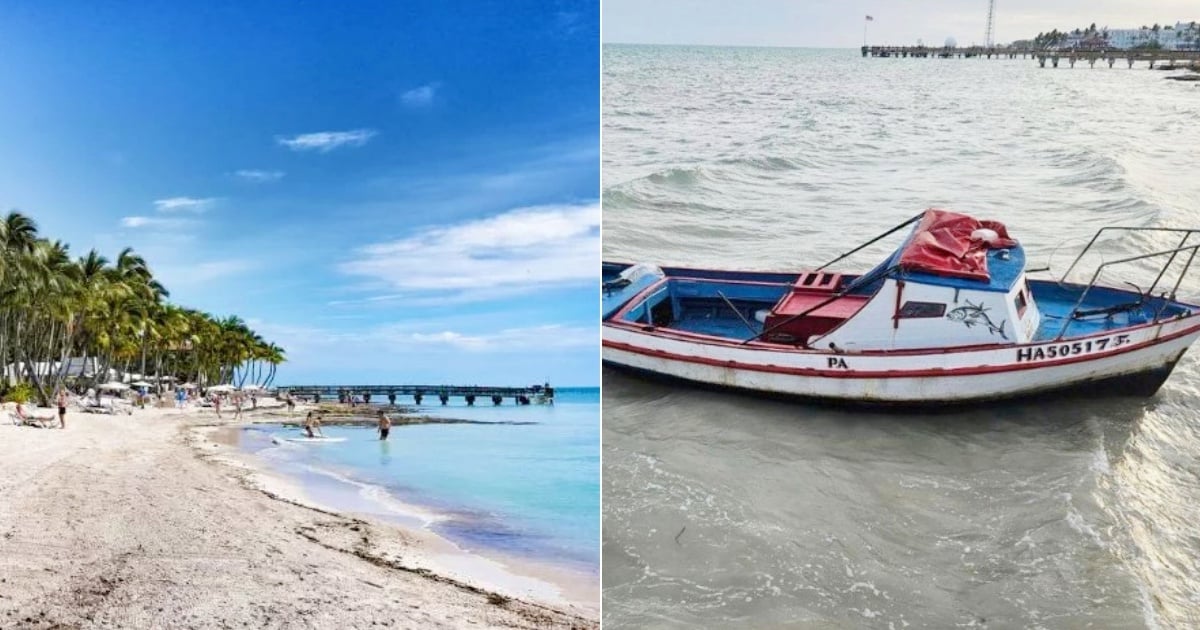A Cuban family reported on Tuesday that their fishing boat was stolen in Havana by a group of 11 migrants who recently arrived on the shores of Miami, Florida. These individuals are currently detained in the United States.
According to Martí Noticias, the case came to public attention on social media, where thousands of users wished the migrants luck, while the boat owners revealed the ordeal they are now facing in the Cuban capital.
"This is my father's lifetime work. All his money. My dad has been a fisherman since he was a child. He always wanted to have a boat and achieved it through his sacrifices, and now it has been stolen," said Claudia Rico Eleveñil, daughter of the boat owner, in an exclusive interview with journalist Mario Pentón from the mentioned outlet.
In the interview, the young woman emphasized that her entire family depends on fishing, and "right now we are left with nothing," a sentiment that becomes more poignant knowing that, in such cases, the U.S. Coast Guard does not return vessels to the Caribbean nation.
The conversation also included Ariel Rico Figueroa, 51, who shared with Martí Noticias that the boat is registered under his name. "They took my boat. All I want is justice in real life. Someone I helped feed, helped get work, even his son. He stole my life's dream," Rico lamented in one of his responses to Pentón.
"Many people comment on social media, 'how great they made it,' but they don’t know what they left behind. They robbed and left a family without their livelihood, and that is not fair," added Claudia Rico during the exchange. Father and daughter also mentioned that the boat is valued at around $17,000, an exorbitant amount considering that the minimum wage in Cuba is 2,100 CUP, roughly six dollars in the informal currency exchange market.
The Investigation and Legal Proceedings
The migrants, on their part, arrived in the United States on the fishing boat, as evidenced by an image shared on the social network X (formerly Twitter) by Samuel Briggs II, head of the Miami Sector of the Border Patrol. The post indicates that they landed in Key West and notes that they departed from Havana. "The investigation is ongoing," the post concludes, without providing details on the circumstances of their detention.
In statements also to Martí Noticias, immigration attorney Rosaly Chaviano assured that the migrants have the right to a defense and "to speak with a lawyer before going through the credible fear procedure to be prepared for their interview."
Meanwhile, the U.S. Immigration and Customs Enforcement (ICE) considers several factors when deciding to release a detainee, such as whether the individual has been previously deported or has committed crimes in the country, the specialist explained.
Nonetheless, the U.S. government continues to insist that all individuals attempting or arriving illegally by sea will not be allowed to stay in the country. They will be processed according to U.S. laws and policies and returned to their country of origin or point of departure.
At the end of May, the U.S. Coast Guard reported repatriating 18 immigrants to Cuba who were detained at sea, while a week earlier, they returned another 31 individuals.
The exodus of Cuban migrants, primarily heading to the United States, whether by sea or land, shows no signs of ending. In April, 17,870 Cubans arrived by sea and land to the northern country, according to statistics from the U.S. Customs and Border Protection Department.
Key Points About the Stolen Boat Incident and Migrant Situation
Here are some frequently asked questions and answers regarding the recent incident involving the stolen fishing boat and the broader context of Cuban migration to the United States.
What happened to the Cuban family's fishing boat?
The boat was stolen in Havana by a group of 11 Cuban migrants who used it to reach Miami, Florida.
Where are the migrants now?
The migrants are currently detained in the United States.
What are the legal steps for the detained migrants?
They have the right to a defense and to speak with a lawyer before undergoing the credible fear procedure.
What stance does the U.S. government take on illegal maritime arrivals?
The U.S. government insists that all illegal maritime arrivals will be processed according to U.S. laws and returned to their country of origin or point of departure.
